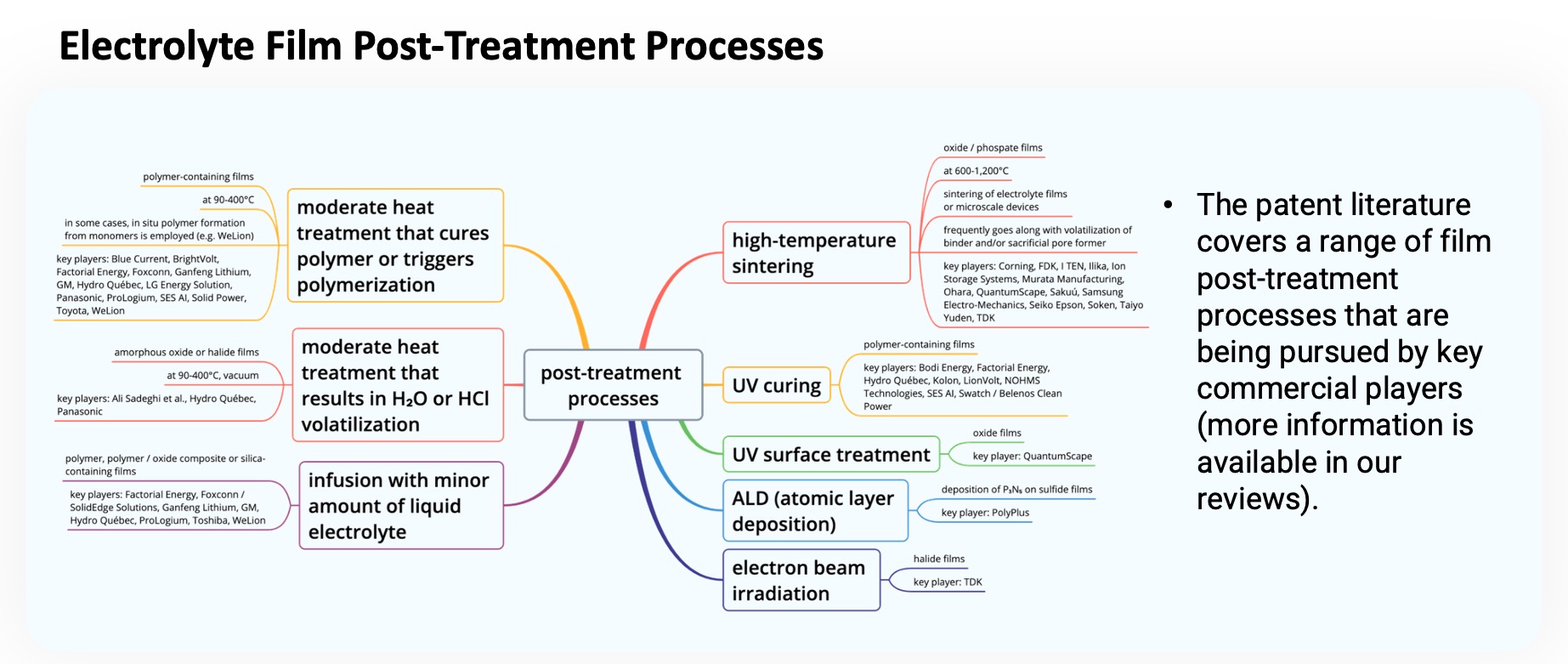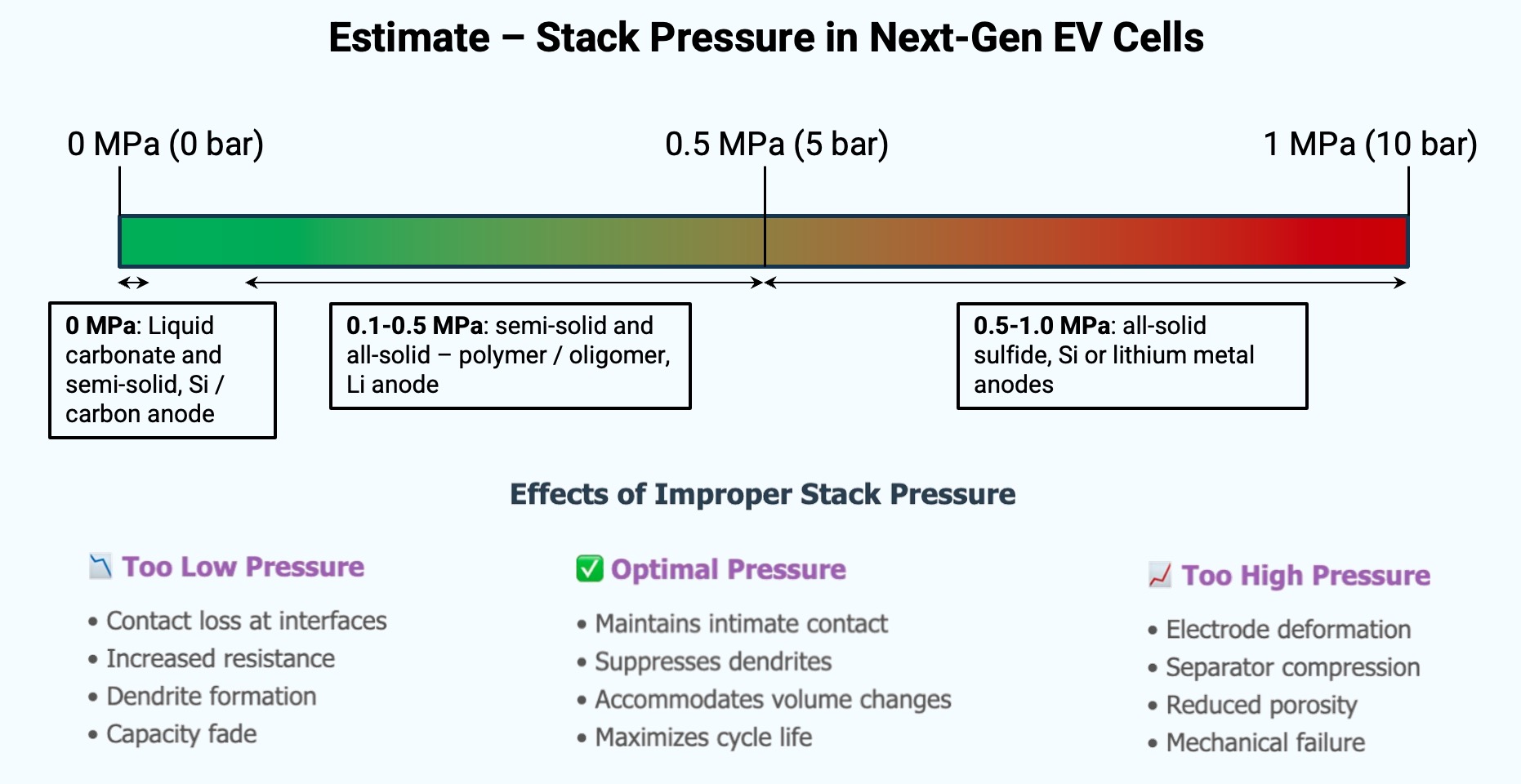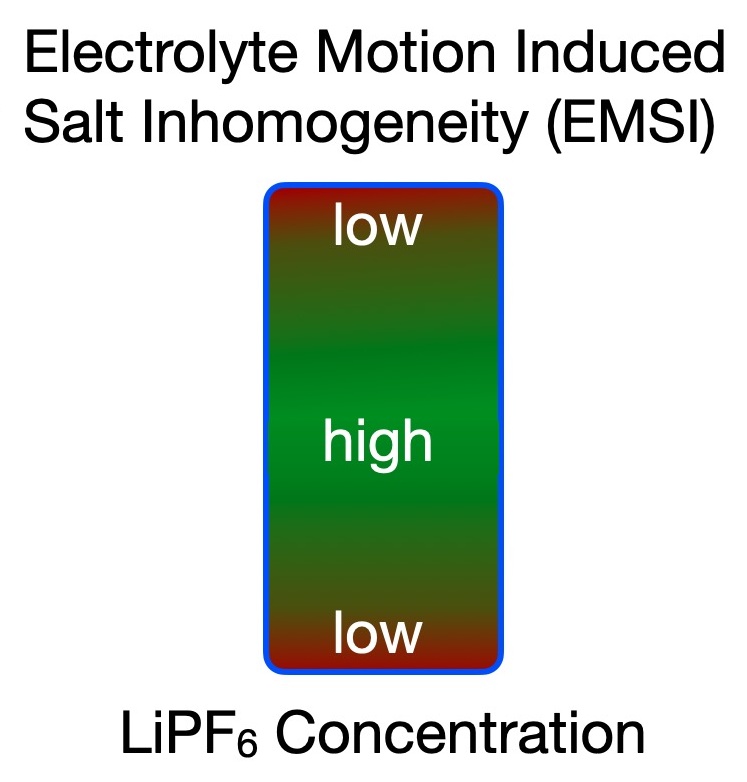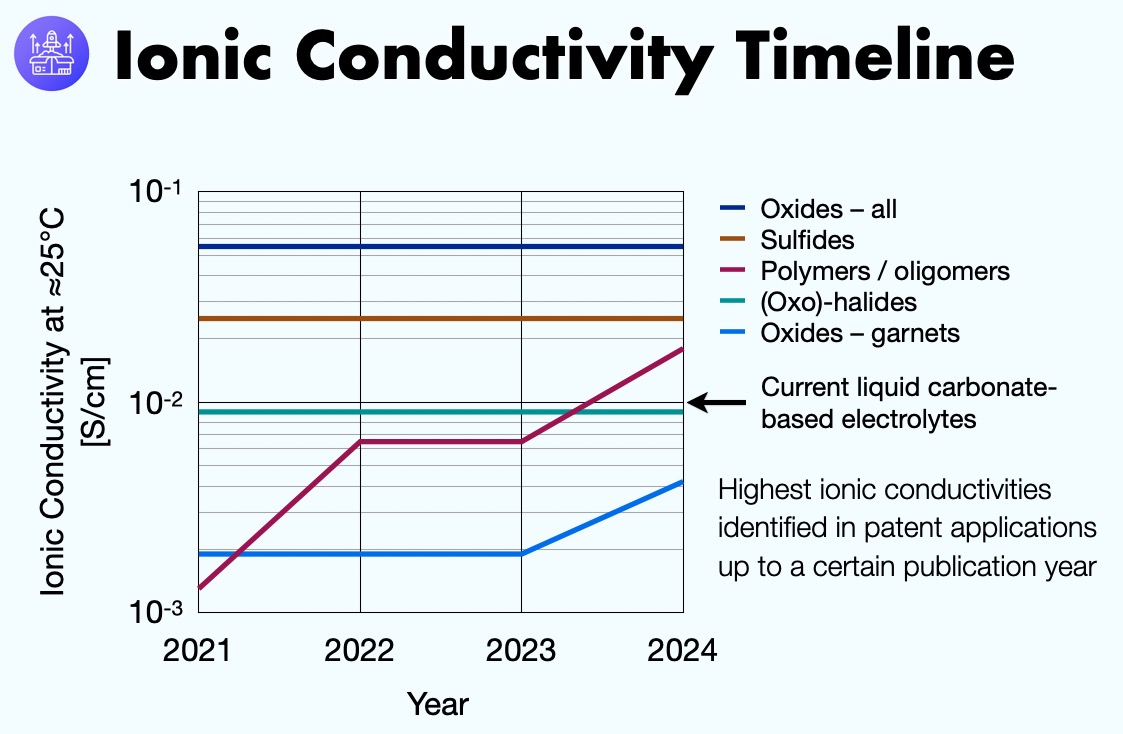-
Update to Terms and Conditions
Posted on 2025-12-11
-
This sentence was removed from our terms and conditions: 'Only manual use of our services are allowed. The use of robots, data mining tools or similar data extraction tools
is not allowed.' (effective date: 2026-01-11).
-
This change allows our customers to
employ AI tools to process our content, as long as the results are kept inside
the customers' organization.
|
-
-
Many thanks to Soeren Striepe for a nice joint presentation at
Advanced Design & Manufacturing Expo – ADM Toronto.
-
It is very important that materials / cell / pack and process development happen synchronously.

-
Read more.
|
-
-
In a joint presentation with Soeren Striepe at The Battery Show North America in Detroit,
we tried to approach the topic of next-gen battery stack pressure from complementary materials and engineering perspectives.

-
Read more.
|
-
-
An extended version of this post was published on BatteryDesign.net.
-
At the recent International Battery Seminar & Exhibit, Prof. Jeff Dahn highlighted how Si-carbon
composite active materials prepared through monosilane deposition on carbon matrices exhibit very
promising cycling stability.

-
Read more.
|
-
-
Many thanks to TechBlick for putting a great event together last week, packed with details on next-generation batteries and corresponding manufacturing processes!

-
Read more.
|
-
-
The 2024 edition of the 'Li-ion Battery High-energy Silicon Anode Innovation & Patent Review' by b-science.net is now available.
-
This review is designed for R&D, IP, product management, business development and VC decision makers involved with the prospective
launch of novel Si-based negative electrode materials and corresponding Li-ion battery cells.
-
Read more.
|
-
-
At last week's 'Solid-State Battery Summit' in Chicago, very nice interactions between academia and industry took place.
-
All-solid-state battery cells are not anymore pursued in a dogmatic fashion. Instead, the importance is being recognized to consider cells in terms of negative electrode / anolyte / separator / catholyte / positive electrode, deciding which layers need to be solid and which may contain some liquids, at least for cells that will be launched next into the market (semi-solid cells).
-
Read more.
|
-
-
Many thanks to Rho Motion for putting together a great conference last week in Paris!
-
According to Rho Motion, BEV / internal combustion engine cost parity has been reached in China (sales weighted average of base price of top 15 BEV & ICE models),
driven by LFP-based cells in the mass EV market segment, and LFP drives widening adoption in large-scale stationary energy storage applications.
-
This post was also published on LinkedIn.
|
-
-
Many thanks to TechBlick for a having put together a great virtual conference last week on next-generation battery product development efforts & market needs!
Thanks for the opportunity to talk about solid electrolyte film formation processes.
-
To achieve successful upscaling of semi-solid and all-solid-state Li-ion batteries, a careful balance has to be achieved between process innovation and risk,
in addition to selecting the right active and electrolyte materials.
-
Read more.
|
-
-
At the recent AABC in San Diego, Sila Nanotechnologies announced the conclusion of a supply agreement for its silicon-based
anode active material with Panasonic for future high-energy EV battery cells. Recently, Panasonic signed a similar deal with Nexeon.
Both active materials will be supplied from US manufacturing plants.
-
This development confirms that a pathway to liquid carbonate-containing Li-ion battery EV cells with 1,000 Wh/L (probably around
360 kWh/kg) has been validated, approximately on par with Prologium's semi-solid / Si-based anode
Li-ion battery cell roadmap.
-
Read more.
|
|
|
-
-
At the The Battery Show Europe conference, a key topic was how new battery materials that lower costs and allow for improved energy density / fast charging can be introduced in the context of huge EV battery production volumes.
-
The commitment by EV makers to deploy semi-solid and solid-state battery EVs (free of liquid carbonate electrolytes) based on redefined supply chains is close to unanimous.
-
Read more.
|
-
-
Many thanks to PlugVolt for the highly professional organization of yesterday's webinar, which was rated 9.5 / 10 by attendees (competency / depth of knowledge).
-
b-science.net projection for the CATL 'condensed battery' based on their patent portfolio:
-
Read more.
|
-
-
Many thanks, Dr. Khasha Ghaffarzadeh and colleagues from TechBlick for putting groundbreaking battery technology on stage last week!
-
The driving force that enables the introduction of new technology approaches depends on each application's current dominant pain point, for example:
-
Read more.
|
-
-
Ni / Mn-containing cathode active materials (such as NMC, NMCA, Co-free NMx) typically account for >50% of overall Li-ion battery cell materials costs.
-
Read more.
|
-
-
Many thanks to the Volta Foundation for the chance to hold a session on 'Commercially Viable Pathways for Solid & Semi-solid Batteries'.
-
Thanks to an interactive audience, it was very interesting to elucidate how solid-state batteries actually have a substantial commercial history
already in business critical, but rather concealed niches, like for the avoidance of power interruptions on printed circuit boards (PCB).
-
Read more.
|
-
-
Many thanks to Adrian Tylim from Blue Solutions for the informative joint session at the The Battery Show North America on 'Divergent Approaches to Solid & Semi-solid Batteries for EVs'.
-
They have deployed solid-state batteries in e-buses together with Mercedes-Benz AG based on lithium metal electrodes that might soon become thinner & cheaper (collaboration with Li-Metal).
-
Read more.
|
-
-
Swappable Solid-liquid EV Batteries
-
At the recent Solid-state Battery Summit in Chicago organized by Cambridge EnerTech, the merits of combining a minor amount of liquid / ionic liquid / low-melting salt (e.g. Li0.8Cs0.2FTFSI with melting point of 40 °C, patent filing by CATL) with solid electrolytes were controversially debated. Such solid-liquid electrolyte approaches make hypothesis-driven research and assessing product development results challenging.
-
Read more.
|
-
-
At the recent Battery Experts Forums, the implications of higher lithium salt prices on battery cell costs and how it usually takes several years to bring new lithium salt mining capacity online were much-discussed topics.
This means that product development investments to reduce the amount of lithium per unit of energy density (in Wh/kg) as quickly as possible will be even more valuable than before.
-
Read more.
|
-
-
My take-away from the panel discussion on 'Solid State Powered Cars in 2024? When and How the Remaining Barriers to Commercial Production Could be Overcome' with
Richard Clark from Morgan Advanced Materials with Dr. Juyeon Park from the National Physical Laboratory UK is that the likelihood that NIO will proceed with
launching a high-range (about 600 miles / 1,000 km) semi-solid battery EV around Q4 / 2022 appears fairly high now. With only a few months remaining,
most of the preparation steps must have been completed already.
-
Read more.
|
-
-
Technical discussions and presentations in Stuttgart provided important insights how positive / negative electrodes and electrolytes emerge and
converge towards solid-state and semi-solid Li-ion batteries.
-
Amprius impressively illustrated their capability to produce 100% Si negative electrodes that permit for energy densities in liquid electrolyte cells of up to 450 Wh/kg / 1,300 Wh/L,
albeit still for niche applications at this stage. A key point that still has to be addressed for EV applications is calendaric longevity (target: >10 years).
These results can be seen as a harbinger for gradually increased Si-content also in large scale applications like EVs.
-
Read more.
|
-
-
Together with Xiaoxi He from IDTechEx (UK), Holger Althues from Fraunhofer IWS (Germany) & Marc Copley from Warwick University (UK), Pirmin Ulmann from b-science.net
joined the panel discussion on 'Solid-state battery feasibility: when & how will we get there?' with 273 attendees.
-
Over the last few months, a close to unanimous industry consensus has formed that solid-state batteries will be adopted in EVs, albeit initially
based predominantly on solid electrolyte layers that might still contain some liquid electrolyte, along with Si-carbon negative electrodes.
-
Read more.
|
-
-
Our key takeaway from this great event is that the secular growth of the battery industry continues. The crisis due to COVID-19 is expected to cause only a temporary
slowdown during 2020 (for example presentation by Avicenne Energy).
-
Diverging opinions exist regarding solid-state batteries. Speakers from large current Li-ion battery suppliers (such as Bob Gaylen, recently retired from CATL and Celina Mikolajczak, Panasonic)
pointed out the high costs and significant time necessary to scale up production for a new technology to the scale of liquid electrolyte Li-ion batteries.
-
Read more.
|
-
-
The conference adjacent to Battery Japan in Tokyo once again provided excellent insights into ongoing R&D activities and market developments, thanks to simultaneous translations
from Japanese to English.
-
Mr. Hideo Takeshita from B3 Corp. explained how market growth for Li-ion batteries continues in mobile/IT and xEV applications, while the
ESS (stationary energy storage systems) market
is growing as well, albeit from a smaller base. Li-ion batteries are starting to encroach on lead-acid batteries in automotive SLI (starting, lighting, ignition)
and UPS (uninterruptible power supply) battery applications.
-
Read more.
|
|
|